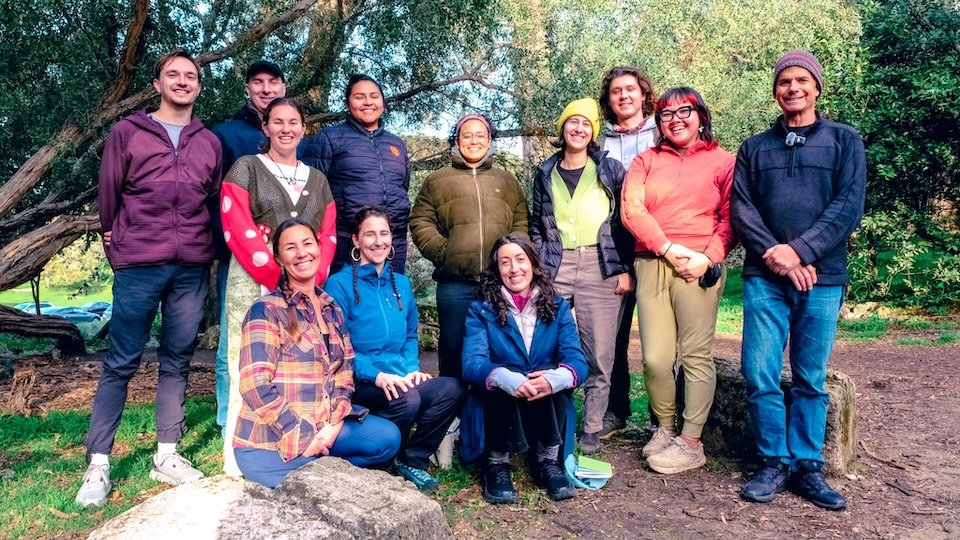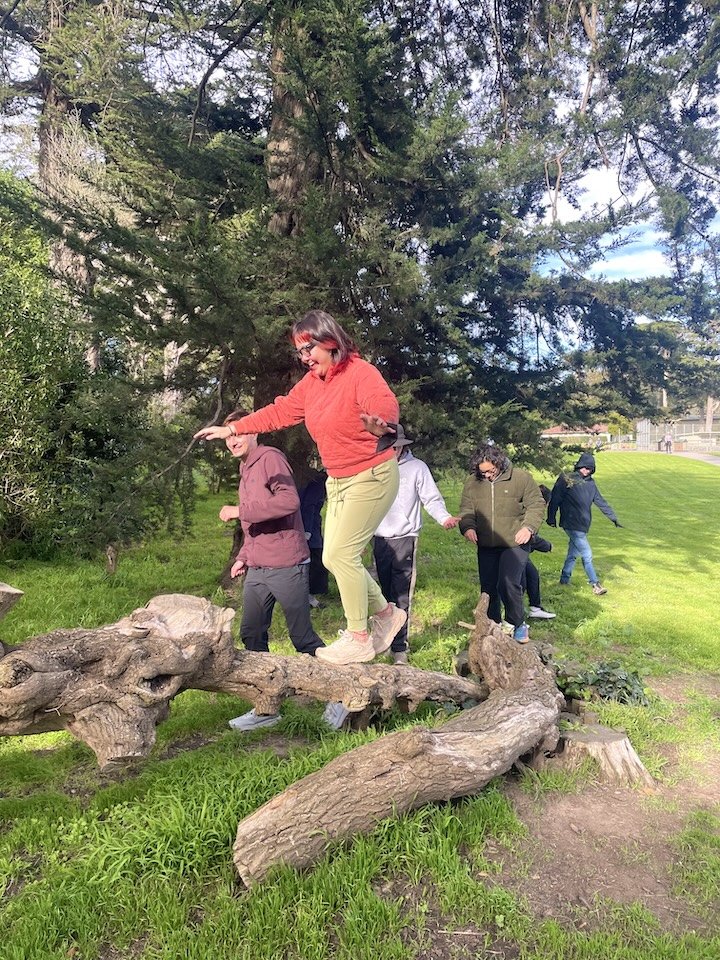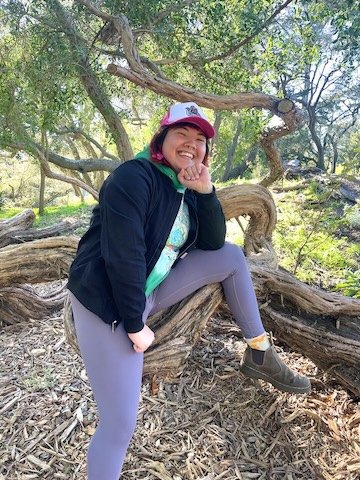Nature-Based Therapeutic Mentoring — in Cities? A Conversation on Expanding to San Francisco
Gateway Mountain Center has been a leader in supporting youth mental health for nearly 20 years — and we’re glad to see many others now joining us in this work. As part of our ongoing commitment to address the youth mental health crisis through innovation, we’re meeting the moment by bringing our Whole Hearts, Minds & Bodies (WHMB) program to San Francisco. This expansion brings youth who are Medi-Cal-eligible and present with moderate to severe symptoms out of the clinic and into the outdoors through clinically supervised, nature-based therapeutic mentoring.
Hear from San Francisco Program Director Joody Marks and Clinical Director Melinda Malher about the journey of bringing Whole Hearts to San Francisco and how authentic mentoring relationships can reach the far corners of Bay Area urban landscapes and connect communities to the healing power of nature.
Authentic Relationships with Self
How did you come into this work?
Joody Marks (she/her): I grew up in the Central Valley — in a family that was impacted by severe mental health and homelessness. And I was lucky enough to have a variety of resilience factors. One of those factors was going to the Sierra Nevada in the summers as part of a backcountry-focused summer camp — where my healing journey really began as a young person.
Joody Marks
SF Whole Hearts Program Director
“As a teenager, I led groups of Bay Area, Central Valley, and systems-impacted youth on backpacking trips in the Sierra Nevada’s wilderness areas. I’ve worked as a naturalist, a wilderness and backpacking guide in Yosemite, a meditation instructor, and a craniosacral therapist.
After working in Yosemite as a park ranger and then spending a lot of off-season time studying yoga and meditation, I moved to the Bay Area and launched a wellness retreat business that provided sliding scale, experiential learning — in wilderness areas and on farms.
I spent the last 10 years focusing on program development and operations management of mental health and health equity projects at the University of California and other nonprofits. It is important to learn how to leverage institutional resources for the kinds of innovative health programs that benefit so many people.”
Melinda Malher (she/her/they): I found myself in leadership roles throughout my career — leading consultation groups, supervising clinicians, and giving conference presentations. I’m also a nature person and love to be outdoors. I believe in the healing power of nature, and the Whole Hearts program has given me the opportunity to use nature as a primary modality and a third party in the relationship between mentors and youth.
Melinda Malher,
MA, LPCC, BC-DMT
SF Whole Hearts Clinical Director
“I’m a licensed professional clinical counselor, a board-certified dance/movement therapist, and a certified synergetic play therapist. I have primarily worked with youth for over 10 years in many settings — from special education to inpatient hospitals and outpatient treatment to private practice and more for children age three onward. I spent the last four years as a clinical director for an eating disorder recovery center here in San Francisco and in Santa Cruz.
As a nature lover, hiker, and trail runner, I’ve completed workshops in ecopsychology and ecotherapy to bring nature into therapeutic settings. As a board-certified dance/movement therapist, I am also invested in mental health services that invite youth to engage in movement and reach them holistically.”
On nature as a third party in the relationship:
Malher: The relationship between the mentor and youth is a vital connection and channel for change, growth, and support. Nature becomes the third party that supports both the relationship as a unit — and then individually supports the well-being of the mentor and the youth.
Authentic Relationships with Youth
What opportunity will WHMB provide youth in San Francisco?
Malher: This program brings youth the opportunity to see and experience the beautiful nature in the city that may not be part of their everyday life. It’s important to address equity and access to natural places in this program. Nature is for everybody. I’m also excited to help youth experience “awe” through nature exposure and bring to life the research behind why it impacts our well-being.
How do you work to ensure youth feel included in the WHMB program?
Marks: Since mentors develop primary relationships with the youth we serve, their capacity to build trust and connect with clients is paramount. It’s a program priority to have mentors who are representative of the communities that we’re serving. Much has been said about how the outdoor, nature-based, and therapy worlds are overindexed for white affluent communities and do not often feel safe and inviting to others. There’s research on the increased efficacy of care when clients can see themselves in their mentors, which can support building therapeutic relationships. So far, we have hired and onboarded 11 mentors with many skills in youth mental health, crisis support, and wilderness programming. We also recognize we have a lot more work to do to increase representation and meet the multilayered needs of Bay Area communities.
WHMB San Francisco
● 11 mentors
● 5 Spanish speaking
● 3 registered associate therapists, 1 Master of Education
● 4 students in masters’ programs for social work or somatic counseling
● 5 with extensive experience leading youth in wilderness settings
“I’m most excited to meet the wide array of participants who will join our program and to help support their growth and well-being as members of our community.
I’m excited to partner with fellow Whole Hearts mentors, share highlights in our daily work with young people, support one another through the inevitable challenges, and celebrate our individual and collective wins in this program.
Lastly, I’m excited to share my love for our Earth (and especially all of the play we can have outside) with my peers and youth, and to help deepen the nature connection that’s alive in all of us.”
Jodie Darensbourg, San Francisco Whole Hearts Lead Mentor, pictured in the background wearing a dark green jacket, with fellow mentors
Authentic Relationships with Therapeutic Mentors
What characteristics or qualities were important in your selection process for San Francisco Whole Hearts mentors?
Marks: Relational skills are really important for the work — as well as mentors being comfortable outside in nature. They need to be able to successfully invite young people into meaningful connection with nature.
Malher: We looked to Gateway Mountain Center’s core values to guide our selection of mentors — always learning, always growing, professionalism, and compassion. Relational authenticity is a vital skill that was embedded into the interview process. Authenticity invites individual strengths to emerge so that the team can learn from each other.
How do you connect with mentors so that they can serve youth in effective, innovative ways?
Marks: I love helping mentors foster a deep personal connection with nature that can be regulating, grounding, and reorganizing — so they can share these skills with young people. We practice nature sensory activities and how to facilitate embodied peak experiences (flow state). Recently, this included a three-day, level one mentor training in Golden Gate Park, a two-day wilderness first aid training, and additional training in Glen Canyon Park and Lake Chabot Park.
Malher: As a clinical supervisor I appreciate witnessing and supporting the growth process in staff — both personal growth and then group growth. I meet with each mentor individually to offer guidance and support for the work they do with mentees.
Sophia Lin
Authentic Relationships with the Mental Health Community
Walk us through the journey of launching WHMB in San Francisco.
Marks: Our founder, Peter Mayfield, made some critical introductions into San Francisco's behavioral health network — in schools, with the Department of Public Health, and more. And the community listening sessions were such a nice way for us to open conversations with service providers in San Francisco. They heard about our program, offered input and concerns, and asked questions so that we could really engage with them about the potential of delivering our program to young people in their systems of care. It’s also really great being able to share that this program has been running for 12 years and that it has Medi-Cal certification. Our community partners, including providers, parents, and youth, are critical to our success.
How are you connecting with the mental health community in San Francisco?
Malher: Whenever Joody and I participate in a meeting with a partner, we show up to listen and be in a relationship authentically — because that’s the service we’re providing to our mentees. We aim to build clarity, communication, and trust through authentic connection. That’s how I show up for my staff — and how I try to show up as a representative of the organization.
In our conversations with partners, some have mentioned that similar programs have come and gone over the years. Our goal is to develop a sustainable service and become a trusted partner for mental health and wraparound agencies in the Bay Area.
How has the reception been for Whole Hearts from service providers?
Malher: There is much positive reception to the Whole Hearts program. We’re working in partnership with psychiatrists, therapists, educational specialists, wraparound agencies, and more to coordinate services.
Some have said, “Wait, you’re gonna do therapeutic mentoring for youth with moderate to severe symptoms — for free? It sounds too good to be true!”
Marks: There’s a lot of excitement and possibility for this program to serve local youth and grow in many ways — one step at a time.
“Our goal is to develop a sustainable service and become a trusted partner for mental health agencies in the Bay Area.”
–Joody Marks, SF Whole Hearts Program Director






